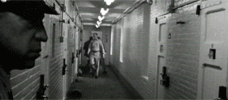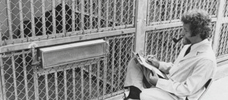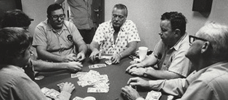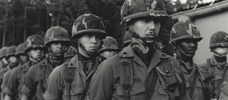Reviews
Frederick Wiseman
USA, 1979
Credits
Review by Cullen Gallagher
Posted on 12 June 2008
Source Zipporah Films DVD
Categories Frederick Wiseman
Paul Simon’s “Slip Slidin’ Away” echoes through a German countryside while cows and helicopters alternate passing by. A group of youths have gathered on their motorcycles to watch a group of American soldiers play football. Nearby, an old man takes a stroll with a cane; somewhere else an older woman, also with a cane, is out for a walk. All the while, several American soldiers are conversing with a young German woman and an older German man. Translating for the man, the young woman explains how during World War II he was captured by the Allies, and how he was thankful that he had enough to eat as he knew that those back home had no guarantee of eating regularly.
Such is the surreality of Frederick Wiseman’s Manoeuvre, his 1979 film documenting a series of training maneuvers undertaken by American troops to test their readiness to support NATO operations, should the circumstance arise. Coincidentally, that same year saw the release of another movie that stressed the surreal experience of war: Francis Ford Coppola’s Apocalypse Now. The aforementioned scene from Wiseman’s film, more modest than anything to be found in Coppola’s film (particularly when compared to the garish extended Playboy bunnies’ performance in the Redux version), is also far more confounding. The “naturalness” of the scene is unsettling: the locals don’t seem to mind the intrusion into their lives and, on the contrary, even seem to be slightly amused by the military’s performance. The soldiers, too, seem to enjoy the curious attention from the townsfolk: with naïve hubris, one soldier even expresses envy of the American soldiers passing through Germany at the end of WWII. This imprint of the past on the present lingers throughout the film with a disquieting reticence.
One of the key differences between Manoeuvre and Apocalypse Now is that while the latter, fictional film maintains the illusion of war throughout, the former, documentary film is unable to maintain any such pretension. The tanks may be real, but the explosions are but rigged special effects with noise and smoke to imitate the ambiance of “real war.” Nor are these soldiers combat weary: with the US military having withdrawn from Vietnam several years prior, most of the soldiers are too young to have fought in the war. In this sense, Manoeuvre is more of a rehearsal than a performance: the soldiers/actors are only just beginning to learn their parts, thus their line-readings are often awkward, lacking both conviction and authority. This is particularly noticeable when soldiers are required to give orders and explain their tactics. As one soldier says (with almost adolescent insecurity):
Also—problem play and Soviet military liaison mission people—will be out—and anytime you see undo cur-curiosity, people looking at you through field glasses, adults hanging around your—your vehicles and positions, report to me and ask them to leave. And if they don’t leave, I’ll come down and get them and escort them out there.
Not only is the phrasing staggered, but the word choices also reveal a strained attempt to recall textbook phraseology. This is in stark contrast to Wiseman’s earlier military profile Basic Training, which emphasizes the slick, well-rehearsed performance of the military institution and the well-defined roles within it.
The most convincing performance of the film is ultimately the most ironic. An officer lambastes his troops for their sloppy conduct as soldiers. Contrary to the overly technical and inarticulate speeches that characterize the film, this officer - clearly one of experience - speaks with simplistic clarity: “Now guys, do I speak English or not? Do you understand what I want? Or don’t you understand what I want? If you don’t understand I can find fucking replacements.” What the officer knows - and perhaps the troops, as well - is that he can’t find replacements: these soldiers are all he has to work with. When the United States ended mandatory conscription in 1973, the military became volunteer-only, and this shift is something that underscores the entirety of Manoeuvre. If Basic Training documented an overly confident army (as characterized by one officer’s declaration, “The United States Army has never lost a war,”), then Manoeuvre is documenting the aftermath of such brashness. Under Wiseman’s characteristic impartial direction, uncertainty and insecurity mar the illusion of an institution that typically presents itself as invulnerable, thus offering an unusually nuanced portrait of an institution all too often stereotyped as one-dimensional.
More Frederick Wiseman
-

Titicut Follies
1967 -

High School
1968 -

Law & Order
1969 -

Basic Training
1971 -

Juvenile Court
1972 -

Primate
1974 -

Welfare
1975 -

Meat
1976 -

Sinai Field Mission
1978 -

Manoeuvre
1979 -

Model
1980 -

The Store
1983 -

Blind
USA -

Adjustment & Work
1986 -

Missile
1987 -

Central Park
1989 -

Near Death
1989 -

Aspen
1991 -

Zoo
1993 -

High School II
1994 -

Ballet
1995 -

La Comédie-Française
1996 -

Public Housing
1997 -

Belfast, Maine
1999 -

Domestic Violence / Domestic Violence 2
2001 / 2002 -

The Last Letter
2002 -

State Legislature
2006
We don’t do comments anymore, but you may contact us here or find us on Twitter or Facebook.



